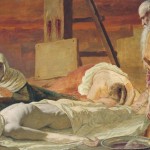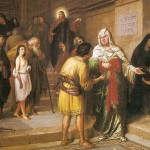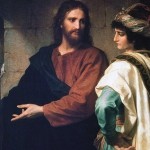Luke 20:41-21:4
WYSIWYG.
“What You See Is What You Get.” It was a revolutionary principle years ago when Apple came out with an operating system that worked under the principle of WYSIWYG. Eventually, Apple forced Microsoft to become better and adopt this principle of computer graphics instead of the nerdy and Herculean system known as DOS.
But what works best in the world of computers isn’t always what’s true for humans. With humans, in this world where God’s glory is hidden in the earthen vessels of human bodies, the principle of WYSINAWYG operates instead: “What You See Is Not Always What You Get.”
That is certainly the case this morning with the rich people and their gifts to the treasury and the widow and her mite. I imagine that those who were rich had the enormous kind of moneybags with dollar signs on them that you see in cartoons. They proceed to dump the whole bag into the coffers of the treasury, savoring each coin as it drops and the musical chords they make when two or three or more drop together. Those who are in the vicinity stop what they’re doing because as everyone know: money talks. And when money talks, people listen. They stop a short while, a little in awe of how much the rich people must have just given to God, and a little envious that they don’t have so much (to give.)
The widow shuffles along, and because she only has two miniscule coins to give, it doesn’t take her very long to give, and her coins don’t have the same ring as those of the rich. Even if someone had paid attention to her, they might have thought she passed by without giving anything because her giving was so unobtrusive.
From the WYSIWYG perspective, it’s obvious that the rich gave so much more, and therefore are to be more honored by men. The widow’s mites, after all, wouldn’t do very much to help build the new all-purpose sanctuary!
But in the WYSINAWYG world in which we live, God measures things differently. The measure is not how much money (in absolute dollars) you give to good things but how much of yourself you give to God. As we learned earlier, in Luke 16:1-18, your money is important to God because it is one of His gifts and a gift which is one measure of your heart. But the real measure is how much of yourself you give to God each day. God has given you a whole self and a whole day, along with all that it contains. How much of that day is given back to Him, for His purposes and His will?
There are Christians who may be very charismatic or leaders or always seeming to do things for God. Naturally, we will assume that they are the rich who are dumping such large gifts into God’s treasury – and often they are. And then there are Christians who don’t seem to have any notable gifts or ministries, aren’t particularly charismatic or popular, and don’t seem to have the knack for winning friends and influencing people. They are the widows in our midst who may lead quiet lives of obedience and humility and yet faithfully give what they do have to God.
I don’t really believe in auras, but sometimes I imagine that if it were possible to measure how faithful one is to God by seeing the size of someone’s halo, we would all be in for enormous surprises. Some of those we thought so righteous and so close to God would have haloes barely able to escape the gravitational force of their heads. Others, who we might think to be of no consequence, might have haloes that enveloped their entire bodies and touched everyone they came near.
It is a dangerous thing to begin comparing yourself to other Christians. I know: I’ve tried it. Somehow, I end up creating a Frankenstein Christian to compare myself to, one who has the charisma of the most charismatic Christian I know, the organizational skills of the most organized Christian I know, the energy of the most energetic Christian I know, etc., etc. Not only does this person not actually exist, but the fact is that I am who God has made me, and so are you.
The real question is “Given who God has made you, and given what God has given you, how much of it are you giving back to God?”
The rich often give very little because they can give large sums without disturbing their lives. Their trust is in their own ability to continue to get things for themselves. But the widow gave back to God all that she had, and that meant not only her money but also her life. Her trust was in the Lord who had given her all.
In the end, without knowing the details of the lives of the rich people and widow in this story, we know that he who sowed sparingly also reaped sparingly and that she who sowed bountifully also reaped sparingly.
Prayer: Father, forgive me for claiming as my own what has been given to me as a gift. Forgive me for trusting in and loving too much Your gifts instead of You. Give me today the true riches of a poor spirit before You that I might give myself to You as You first gave Yourself to me, through Jesus Christ our Lord. Amen.
Point for Meditation:
Have you been more like the rich people in today’s lesson or the widow? How much do you still find that you trust in God’s gifts instead of God the Giver?
Resolution: I resolve to find one way to give back to the Lord today one thing He has been asking me to give.
© 2011 Fr. Charles Erlandson











